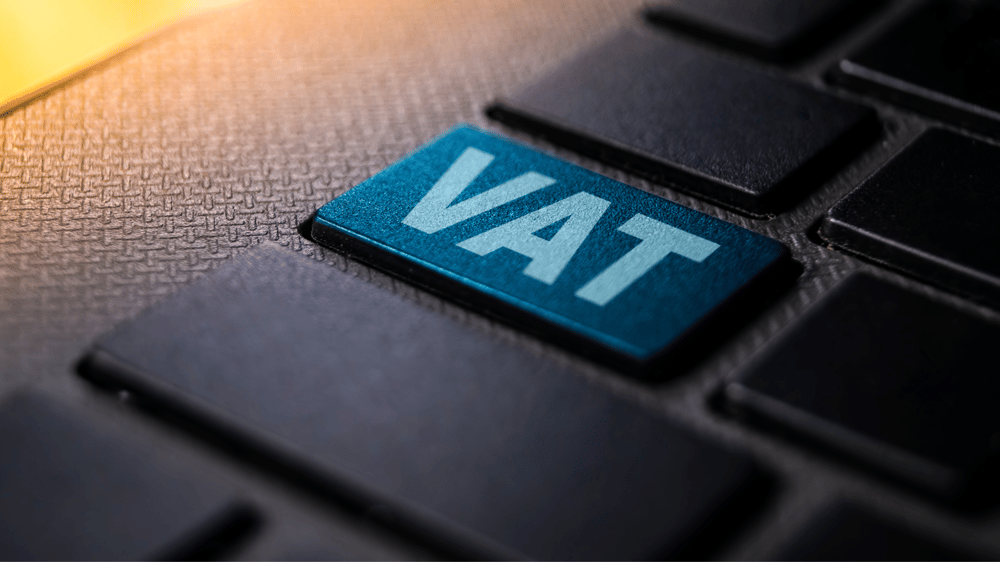VAT is a tax that is added to the value of goods and services at every stage of production or distribution. As a consumer, most of the goods or services that we purchase have VAT included in the price.
As a business owner, once you complete VAT registration in Ireland, you are obliged to charge VAT on the products and services you sell. You also need to account for VAT in your VAT returns and pay VAT to Revenue.

How to register for VAT?
In Ireland, to receive a VAT number, you will need to fill in a tax registration form and submit it to Revenue. During the VAT registry process, Revenue will want to see evidence that you trade with Ireland.
Revenue decides whether to accept or reject your application based on the evidence you submit.
When to register for VAT in Ireland?
In general, as a new business, you don’t need to register for VAT from the moment your business is set up. There are certain criteria your business must meet before you start charging VAT on your goods/services.
It’s important to note that both Sole Traders and Limited Companies are eligible to register for VAT, and you should consult with an expert about registering for VAT before you do so.
Things to note before you apply for a VAT number
- You need proof that you require a VAT number
-
A mix of customers and suppliers in Ireland
-
1-page business plan
-
.ie web domain
-
The business owner/Director lives here
-
You have a physical office in Ireland, a Virtual Office will not be accepted
-
An Irish phone number
How long does it take to get a VAT number in Ireland?
Once Revenue has received your VAT application, it can take 28 working days before you have your VAT number, and this is without any enquiries from Revenue.
Who needs to register for VAT in Ireland?
A taxable person (individual, partnership or company) who supplies taxable goods or services in Ireland. VAT registration is obligatory when your turnover exceeds, or is likely to exceed, the VAT thresholds. The thresholds depend on your turnover in any continuous 12-month period. If the turnover is less than a threshold limit, you may elect to register for VAT.
The principal thresholds are as follows:
-
€42,500 in the case of persons supplying services only.
-
€85,000 for persons supplying goods.
-
€10,000 for taxable persons making intra-Community distance sales of goods and cross-border TBE services into the State.
-
€41,000 for persons making acquisitions from other EU Member States.
If you have set up a business but have yet to supply taxable goods or services, you may reclaim VAT on your start-up costs. However, to do so, you are required to register for VAT.
What is the rate of VAT in Ireland?
The standard VAT rate in Ireland is 23%. It applies to most goods and services.
The first reduced VAT rate (13.5%) applies to fuel, electricity, vet fees, construction, arts and theatre tickets, cleaning services, catering and restaurant services.
The second reduced VAT rate (9%) applies to newspapers, electronically supplied publications, sporting activities’ facilities.
Zero-rate: 0% : Irish zero-rated goods and services include all exports, some foodstuff, books, children’s clothes and shoes, disability aids.
Exempt: 0%
Understanding corporate taxation alongside VAT is important for businesses. Read our full guide on Ireland’s corporate tax rates and compliance requirements to stay informed.
What VAT can you reclaim?
You may reclaim the VAT charged on goods and services used for your taxable supplies.
Some examples include:
- Accounting and legal services
- Office equipment and supplies
- Marketing and advertising expenses
However, VAT cannot be reclaimed on:
- Employee food, drink, and entertainment
- Certain accommodation expenses
What is reverse charge VAT (self-accounting)?
There are a number of circumstances where reverse charge VAT applies, such as:
Reverse charge VAT applies in specific cases, such as:
-
Purchasing goods from another EU member state
-
Receiving services from abroad
Under this mechanism, the recipient of the goods/services accounts for the VAT instead of the supplier. Proper VAT filing is crucial in these cases to avoid compliance issues.
What are the filing obligations and deadlines for VAT?
Businesses registered for VAT must file VAT3 returns every two months. The deadline is the 23rd of the month following the reporting period. For example:
📅 January-February 2025 VAT3 return → Due by March 23, 2025
To ensure timely VAT compliance, many businesses seek professional tax support.

%20copy.jpg)




.svg)